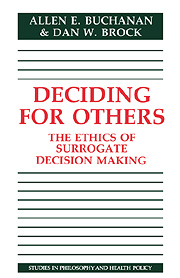Book contents
- Frontmatter
- Contents
- Preface
- Dedication
- Introduction
- Part one Theory
- Chapter 1 Competence and incompetence
- Chapter 2 The primary ethical framework: patient-centered principles
- Chapter 3 Advance directives, per son hood, and personal identity
- Chapter 4 Distributive justice and the incompetent
- Part two Application
- Looking forward
- Appendix one Living trust and nomination of conservatorship
- Appendix two Durable power of attorney for health care
- Notes
- Index
Chapter 4 - Distributive justice and the incompetent
Published online by Cambridge University Press: 05 June 2012
- Frontmatter
- Contents
- Preface
- Dedication
- Introduction
- Part one Theory
- Chapter 1 Competence and incompetence
- Chapter 2 The primary ethical framework: patient-centered principles
- Chapter 3 Advance directives, per son hood, and personal identity
- Chapter 4 Distributive justice and the incompetent
- Part two Application
- Looking forward
- Appendix one Living trust and nomination of conservatorship
- Appendix two Durable power of attorney for health care
- Notes
- Index
Summary
THE NEED TO QUALIFY THE PATIENT-CENTERED APPROACH
The courts, as well as most legal scholars and ethicists, have tended to assume that any explicit role for a consideration of the rights and interests of others in decisions concerning imcompetents should be strictly excluded. This reluctance to face up to the fact that others' rights and interests impose limits upon the moral authority of advance directives, the substituted judgment principle, and the best interest principle betokens an understandable and (up to a point) praiseworthy recognition of the extreme vulnerability of the incompetent individual. The key court cases from which these standards have developed and that have shaped the course of the debate have concerned the most momentous decisions – withdrawal or continuance of life-sustaining treatment. A reluctance to depart from a patient-centered approach and explicitly address questions of distributive justice, especially those relating directly to costs, is all the more understandable in cases of life-ordeath decisions for incompetents.
There is another, less obvious, reason why these decisions – and hence the broader ethical debate whose assumptions they have fashioned – have not faced resource allocation issues head-on. The U.S. legal system operates on the “standing case rule,” according to which courts are to respond only to actual cases brought by or on behalf of identified individuals. Yet it is in the case of the particular decisions that affect the welfare of identifiable individuals that there is the most discomfort about “rationing” scarce resources.
- Type
- Chapter
- Information
- Deciding for OthersThe Ethics of Surrogate Decision Making, pp. 190 - 212Publisher: Cambridge University PressPrint publication year: 1990

